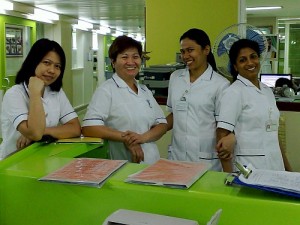
Judith Brown, the head of nursing and midwifery at the Dubai Health Authority, said the move would have a great impact on the health of the emirate. “The profile of the midwife and nurse has traditionally been very low,” she said, “despite all the marketing that has been done. We now want to raise the profile.”
About 3,000 nurses and midwives, mostly from the Philippines or Arab countries, work in the public sector in Dubai. Ms Brown said the aim was to train existing staff to perform new roles. She added that only when more nurses had a greater range of skills could primary health care reach its full potential.
Alison Ramsay, the director of nursing at Al Wasl Hospital, said the profile of nurses in some countries had grown hugely in recent years.
“Nurses and midwives want to be seen as valuable members of the medical team. In other parts of the world it is not uncommon for someone to have treatment without ever seeing a doctor. This is what we would like to work on here.”
Ms Brown said there was also a need to put more effort into local recruitment. “One of the things I think we need to do is go out to the schools and talk to the schoolchildren about the opportunities,” she said. “We also want to make people aware of the training they can do here.”
The health authority has worked with a number of educational facilities including Dubai Women’s College to open doors to potential recruits.
A new programme at the college enables students to take a four-year midwifery course, rather than first training to be a qualified nurse.
There are also drives to hire more Emiratis, particularly in remote family medicine clinics. Dr Abdulla al-Khayat, the chief executive of Al Wasl Hospital and a paediatrician, said that as an Emirati, he fully appreciated the difference Emirati women could make in the health system.
Omnia Hassan Sakr, 29, was a nurse in Al Wasl Hospital for nine years before being sponsored to become a midwife.
“People do not realise all the work they [midwives] do,” she said. “It is not just delivering the baby but they are involved from the beginning; even before a woman gets pregnant they can offer pre-conception counselling.”
Ms Sakr is one of 23 qualified nurses who have been sponsored by the Dubai Health Authority to take a one-year midwifery course. She is studying at the women’s college.
“Unfortunately nursing is not a high-profile profession in this part of the world,” she said. “People do not know what services we provide. Many think we just administer medicine and put people to bed. This is not the case.”
When Ms Sakr qualifies, in March, she intends to work in a hospital in Dubai. However, she is also keen for midwives and nurses to take on an expanded role.
“I don’t think the communities are ready for community midwives yet,” she said. “It will take time.”
Article courtesy The National munderwood@thenational.ae